Is there racism in Russia?
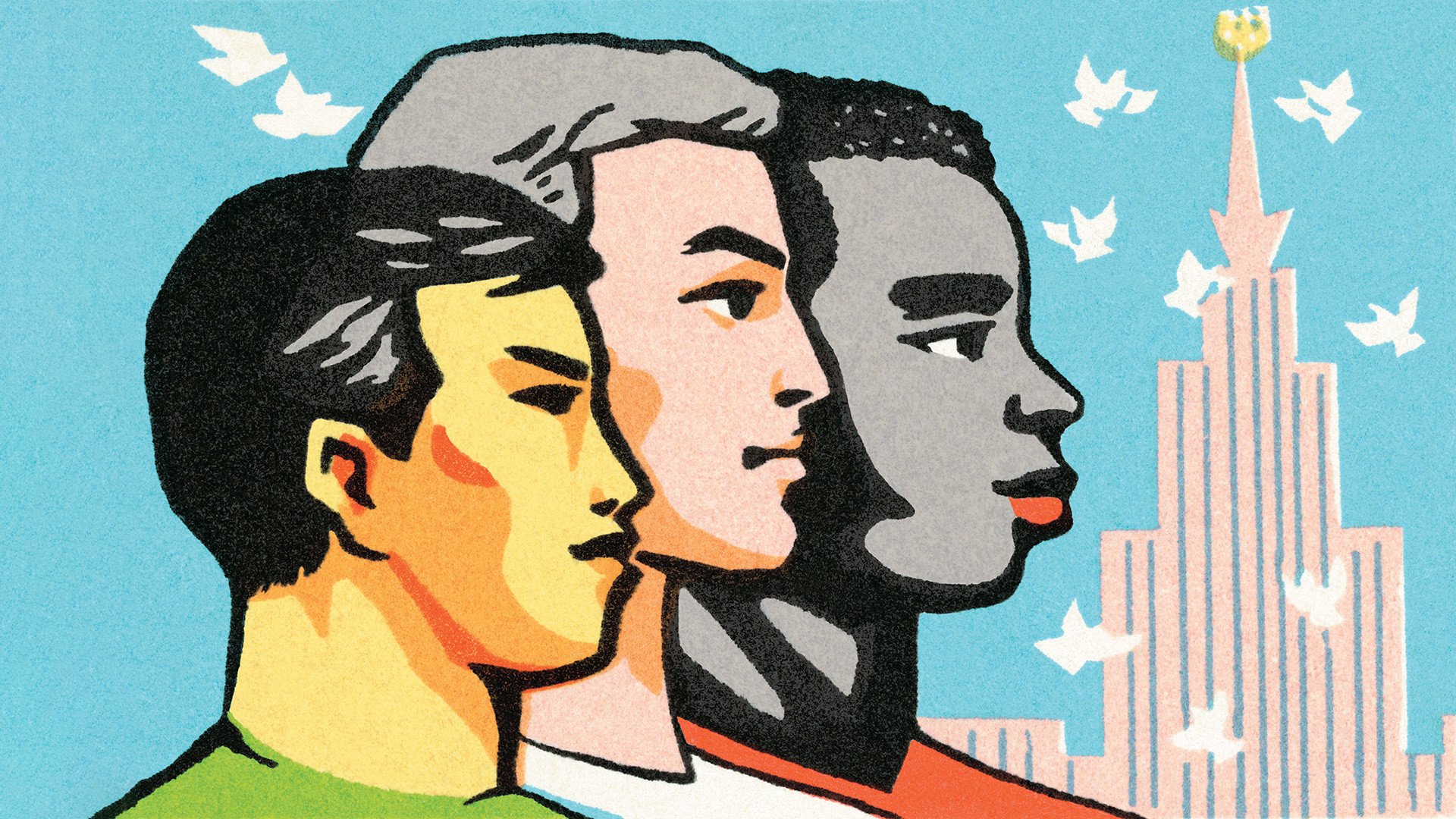
Having finished her workout at an elite downtown fitness center, 28-year-old Stella headed for the showers. She barely had time to start when she heard agitated complaints from a middle-aged woman: “What’s that blackness doing here?” The young woman first thought that it might have been an unrelated conversation between two other people. It quickly became clear that that wasn’t the case when another woman began to stand up for Stella, asking the attacker where she got the idea that she could address anyone, much less a stranger, in such a horrible manner.
“So, I decided not to keep silent and approached the woman to ask if she was talking to me. In response, I was told that I’m ‘blackness’ that doesn’t belong here, that I’m a prostitute and a lot of other things,” the fashion model recalls. “Let’s remember for a second - this was a 70-year-old woman, while the price of an annual membership to the gym is 60,000 rubles (approx. $816). I had no idea that anyone who could afford such a fee was capable of holding these sorts of views, I was in shock…!”
Stella was born in Rwanda. When she was 11 months, the family relocated to Moscow. Taunts and hatred on the basis of her looks would start haunting her from that moment on. And she’s not alone: Asian migrants from non-Soviet countries, including holders of Russian citizenship (which number more than 160 nationalities) - even Russians themselves, for associating with the “other” - are all potential targets of harassment.
An equal measure of disdain
In 2019, the number of migrants in Russia exceeded 12 million - eight percent of the country’s population.
Most migrants in the pre-pandemic year came from Ukraine (299,000), Kazakhstan (close to 50,000), Tajikistan (44,000), Armenia (24,000) and Uzbekistan (19,000). Meanwhile, the level of intolerance towards migrants grew from 54 to 71 percent in 2017-2019, according to Levada Center data. The figures represent the number of respondents that named one or more ethnic groups they would like to see less of in Russia.
Xenophobic attitudes often change in line with global events. “In 2014, after Crimea joined Russia [followed by a rise in anti-Russian sentiments in Ukraine], the normally positive attitude the Russians have toward Ukrainians began to worsen - if not extremely, then at least to a noticeable extent,” says Karina Pipiya, a sociologist with the ‘Nuzhna Pomosch’ charity foundation.
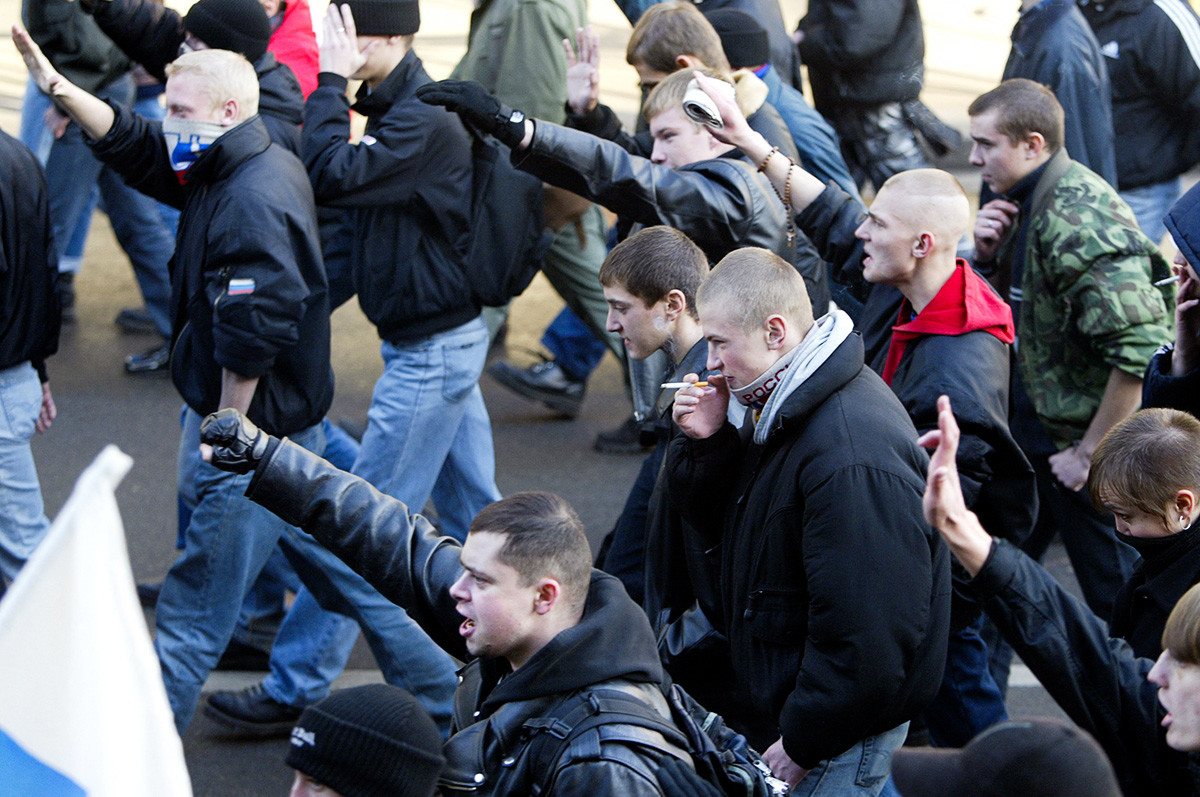
Demonstrators shout slogans during a march organized by several ultranationalist organizations, marking the new People's Unity Day holiday in central Moscow, 04 November 2005, calling for an end to the "occupation" of Russia by illegal migrants.
AFPOwing to some Russians’ unwillingness to understand the life and culture of other ethnic groups, myths about them continue to spread - for example, that migrants from Central Asia are often criminals. And the same is often said of the Roma, according to Pipiya.
“Police statistics refute these rumors. Research [conducted by Pipiya herself in 2017] shows that, in day-to-day life, almost every second Russian does not encounter any migrants; meanwhile, more than two-thirds still exhibit negative attitudes toward them, which extend to the desire to refuse entry to the Russian Federation,” the sociologist explains.
According to the Prosecutor-General’s office, the number of crimes committed by foreign nationals and those without citizenship has been steadily declining since 2015. In 2020, it fell to 34,400 out of a total of two million. The police noted that only 3.5 percent of all crime in Russia is committed by foreign nationals, although the number is considerably higher in regions with a high concentration of migrants - places like Moscow and the wider region and St. Petersburg, where the figure rises to 20 percent over the last nine months of 2020.
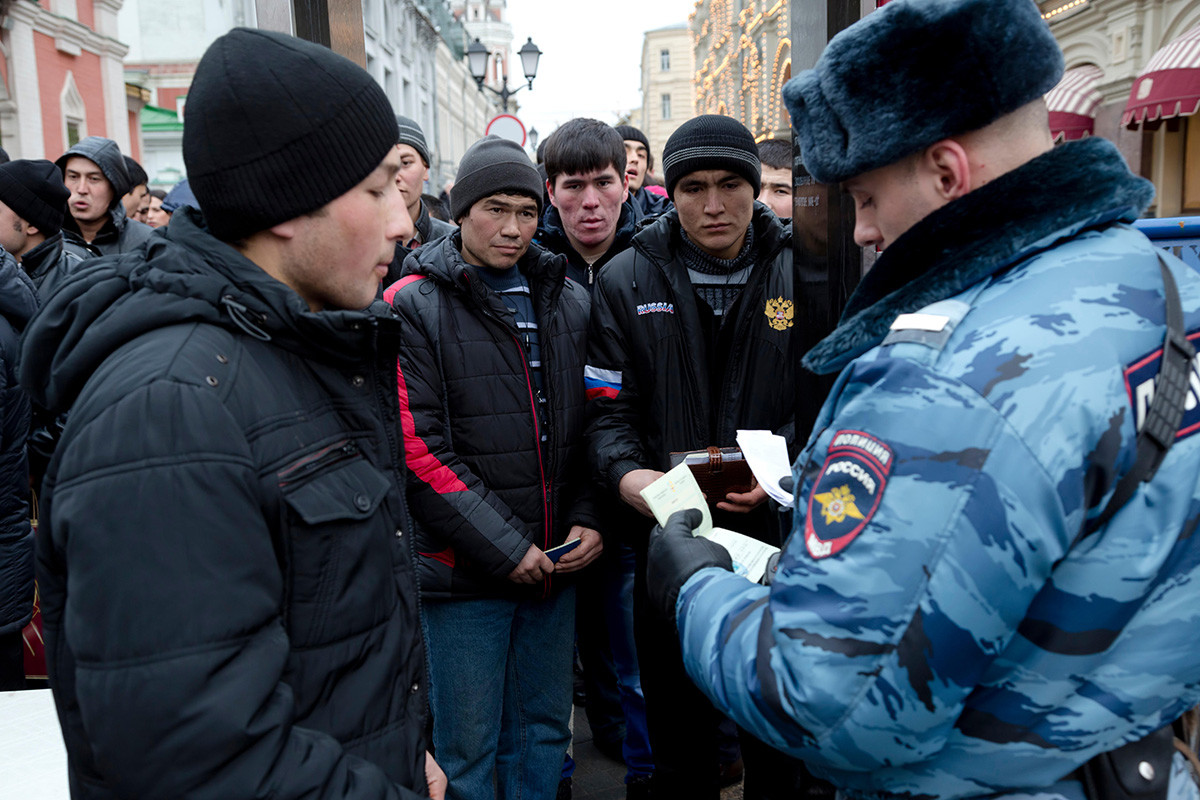
A Policeman Checks Documents From Migrant Workers From Central Asia During An Entry To Red Square In Moscow, Russia
Legion MediaMeanwhile, there is no pronounced anti-black racism in Russia - so much so that the Russian language never expelled the word ‘negro’ from its lexicon: it was simply used as a way of saying ‘African’ and never to explicitly offend, the way its English slang counterpart is. However, despite this, black people aren’t treated much better than other migrants in practice, according to Pipiya. Not all Russians support inter-race marriages or wish to be neighbors with people from Africa. But there are much fewer African migrants than others, so the situation isn’t as pronounced with regard to them, the sociologist adds.
“The scant numbers of blacks in Russia, concentrated in bigger cities - their invisibility does not provoke the population into committing acts of violence or develop negative attitudes: one couldn’t say that they are taking all the jobs, or that they occupy every market niche. Central Asian migrants, on the other hand, are visually represented and noticeable, so these xenophobic models of behavior function actively with respect to them,” Pipiya explains.
Born hatred
Stella first encountered racism in kindergarten. “A boy called me names, I can’t remember what exactly, but I went to my mom and she told me to get him back next time and I did. First, I would ask help from my parents, but they always said that the kids who hurt me are simply fools and this didn’t help. Once, in school, I’d stopped talking about it, stopped complaining, kept it all inside,” she says.
Stella encounters harassment online and in real life on a monthly basis. In May 2021, unidentified people started sharing her photo on social media with the caption: “N*****, go back to Africa, don’t embarrass the Slavs.” They would also write to her and issue the same demands.
“It feels terrible, but it’s also done by stupid people, who’ve never achieved anything in their lives, so they blame others for their personal failings. Kids must be taught early that different nationalities exist and that they all can live in peace,” she says.
Muhammaddior, 15, is a Uigur national, who moved with his parents from Kyrgyzstan when he was eight. Since first grade, he was called the a ‘n*****’ and a ‘monkey’.
“When I told my father this one day, he told me: ‘So, beat them up, you’re a boy, aren’t you.’ I really didn’t want to hit anybody and after those words I stopped telling him about such things altogether,” Muhammaddior says.
In February 2021, several of his classmates shared a photo of their classmate in a group on Russian social network ‘VK’, adding that he was gay and callng for people to find him and beat him up.
“It’s impossible to put into words what I felt. Of course, there were people who were on my side, but there were those who really wanted to beat me up while using the words ‘Tajiks must die’, or ‘Blacks aren’t people’. The story ended with the classmates being put on the police watchlist,” Muhammaddior remembers.
According to him, he was ashamed of his own skin color for a long time, dreaming of becoming lighter. At 15, the student started a TikTok channel to talk about his problems - he says it helps him deal with the insecurities he’s been made to have.
“Many wrote in, saying that I was really handsome and I started to love myself after that, my opinion began to change. I’m currently in my homeland [Kyrgyzstan] on vacation. I’d like to relax after ninth grade and exams are coming up, so I need to focus on my studies.”
‘You can love a normal person - not a black’
18-year-old Darya Gashimova, who studies journalism at the Astrakhan State University, is no stranger to racial slurs - she’s been called all manner of things since school age. Darya is an Azeri with Russian citizenship, born and raised in Astrakhan, where she’s lived all her life.
“It was completely normal for my agemates to joke about my ethnic descent. They would blurt out unbelievable things whenever I faltered in the slightest, accidentally - no matter how small the misstep, my nationality was always used as its cause. It was funny and cool for them - and really hurtful for me,” Darya recalls.
To this day, her parents don’t understand the origins of such a level of hatred.
“They would always wonder how such a thing was possible when their generation all came from the USSR - a country where dozens of sister republics lived in peace. Where could such hate come from for non-Russians?” Gashimova exclaims.
Another young woman by the same name is a Russian citizen hailing from Gorno-Altaysk, a city in Siberia. Since 2016, she has been living and working as a product manager in Berlin. She met Alex from Brazil at a party there and the pair have been dating for several years now. In 2020, she started an Instagram page, where, among other things, she posts pictures of her boyfriend. A nationalist group calling itself ‘Muzhskoye Gosudarstvo’ (‘Man’s Nation’) - blocked by VK in 2020 for incitement to violence - began calling the girl a “prostitute”, an “inkwell” and “an embarrassment to the Russian people” - slurs reserved for women dating across races or ethnic groups.
“One should love a normal person - not a n*****”, “How about we cut off your head”, “So sorry for the grandfathers who fought for us and had no idea their granddaughters would become doormats!” These are just some of the comments the woman has received.
Darya’s parents, likewise, didn’t immediately accept her choice. They wouldn’t speak to her for four whole months. It would take the family a year to repair the relationship entirely.
“At first, I took everything really seriously, even thought about deleting my account. Then I began talking to other girls that date dark-skinned men and understood that I wasn’t alone. My man was a real source of strength for me in that period. He would share stories about facing racism even in Germany. So, we persevered,” Darya says.
The nationalist groups Russia Beyond has reached out to for comment have declined our requests.
Declining trend for racism?
Despite the country’s Soviet past, which promoted the idea of friendship between the various republics, the USSR still contained garden-variety racism, which would later simply spread with the country’s dissolution, according to Daniil Kashnitsky, junior fellow at the Center for Qualitative Social Policy Research at the Higher School of Economics in Moscow.
There has been a noticeable increase in Russians mingling with migrants over the past 10 years, with racism and xenophobia popping up less in cities such as Moscow and St. Petersburg; however, the attitudes continue to rear their ugly heads in Russia’s regions, the expert claims.
“For instance, skinhead groups were a common sight in Moscow all the way until the 2010s. They would roam the streets beating up migrants from Central Asia. Today, they barely exist. However, unfortunately, racism continues to live at the day-to-day and legal levels - for example, policemen may still stop someone over the color of their skin, hoping to find an expired residency permit and either send the person home, or let them stay in exchange for a bribe. In other cases, people may not wish to rent their property out to migrants,” Kashnitsky explains.
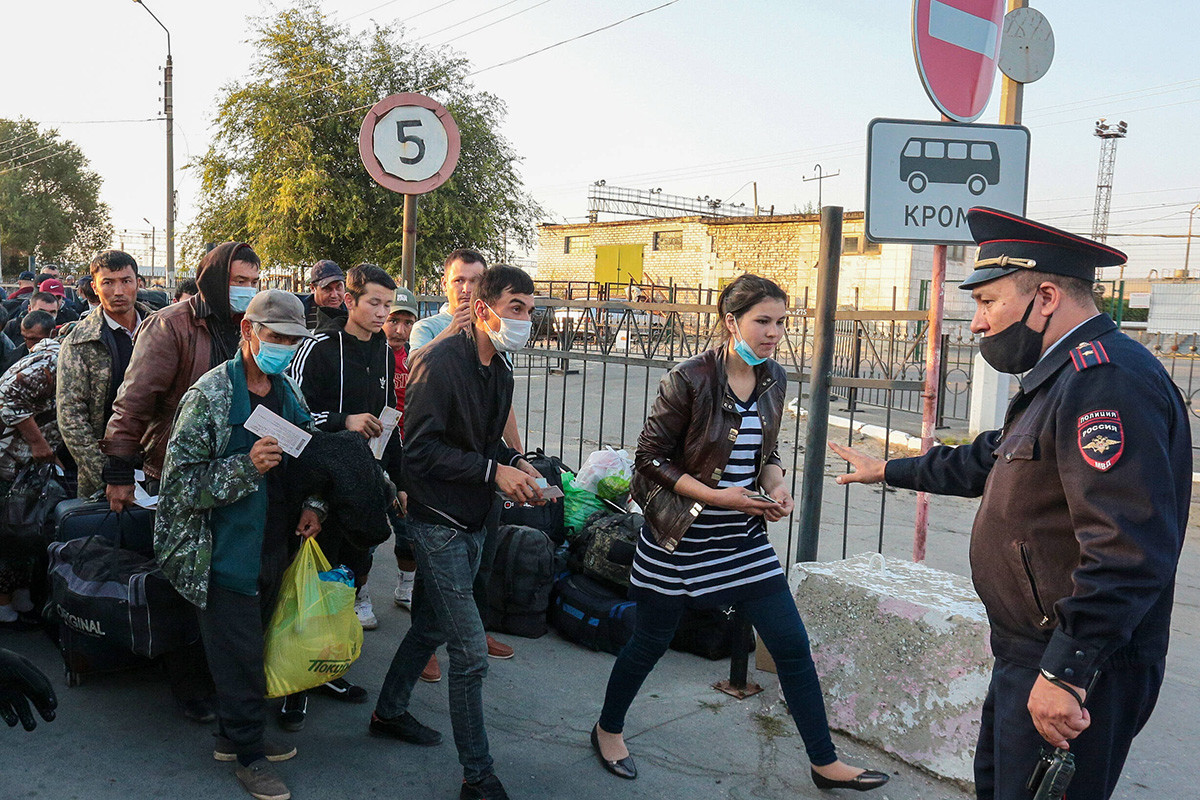
Police Officer Gestures To Uzbekistan S Citizens Who Have Arrived At A Railway Station Forecourt Before Being Repatriated. From March 16, Russia Temporarily Ceased Railway Communication With Uzbekistan To Prevent The Spread Of The COVID-19 Pandemic
Dmitry Rogulin/TASS/Legion MediaSuch levels of xenophobia in Russia have been known to appear at times of local political and social strife, according to Pipiya.
“Russians are once again experiencing social-economic unrest and xenophobia is a way to expel this pent-up resentment, a search for a scapegoat. In this way, during the quarantine, for example, the internet began teaming with rumors that ‘migrants are about to go on a robbing and killing spree’. To some extent, this is a natural process that occurs in times of turbulence: the lack of stability (of any kind) in the public sphere gives rise to fear and apprehension, which are always localized in the image of the enemy, for example - the migrants,” Pipiya explains.
The Russian Criminal Code’s article ‘on the incitement of hatred or attacks on the dignity of a person, based on race, nationality, language or faith’ can result in punishment in the form of a 500,000-ruble fine (approx. $6,800) or a prison sentence of two to five years. In 2018, charges were filed against 426 people; in 2019 - only 19. The most prominent cases concerned people posting memes that were deemed by law as offensive toward religious people.
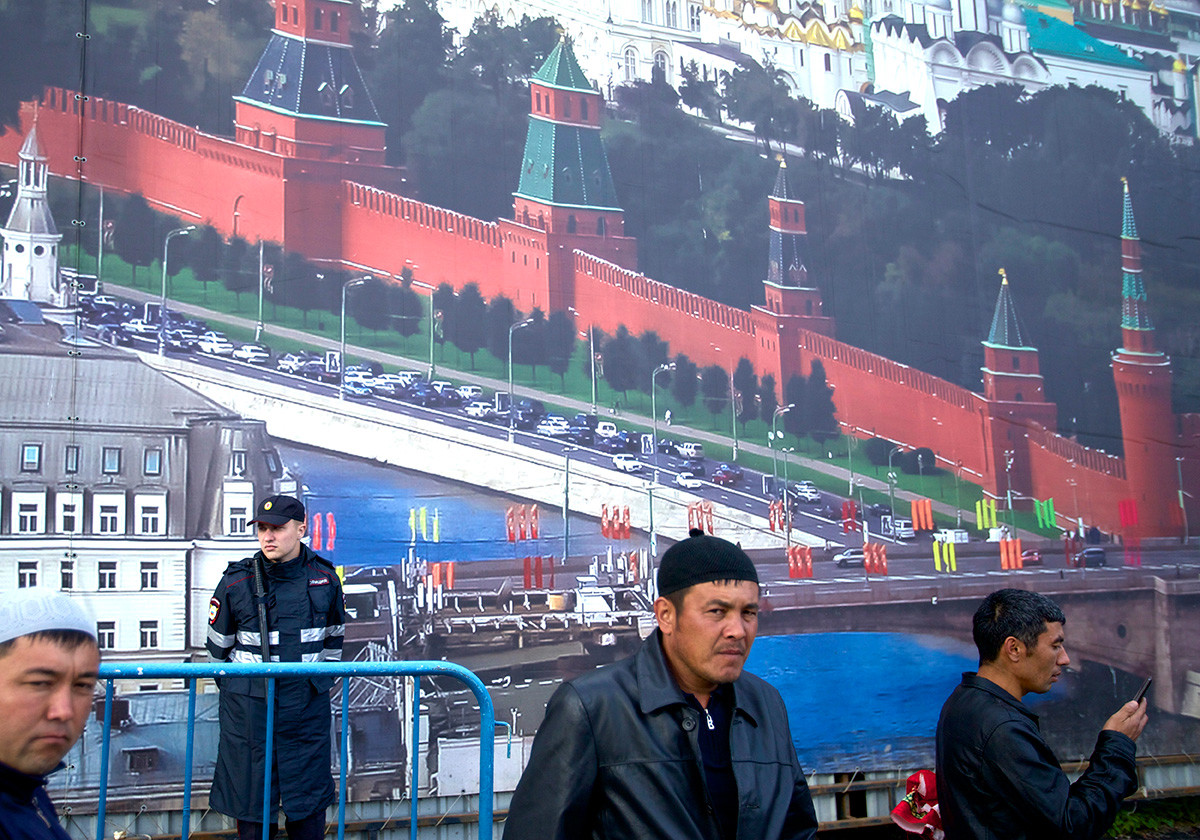
Muslim men, mostly migrant laborers from Central Asian countries, stand next to a fence decorated with picture of the Kremlin as they prepare for Eid al-Fitr prayers outside the Cathedral Mosque in Moscow, Russia, Tuesday, July 5, 2016
APAccording to Kashnitsky, the level of racism in Russia can be brought down, but this would require a “strong political will”.
“This is absolutely necessary, as it’s in part thanks to those working migrants that we are compensating for the demographic downtrend. But, there is a need for concrete solutions from both the legislative and executive branches of the government (The Ministry of Internal Affairs, Rosgvardiya and so on),” Kashnitsky believes.
If using any of Russia Beyond's content, partly or in full, always provide an active hyperlink to the original material.
Subscribe
to our newsletter!
Get the week's best stories straight to your inbox